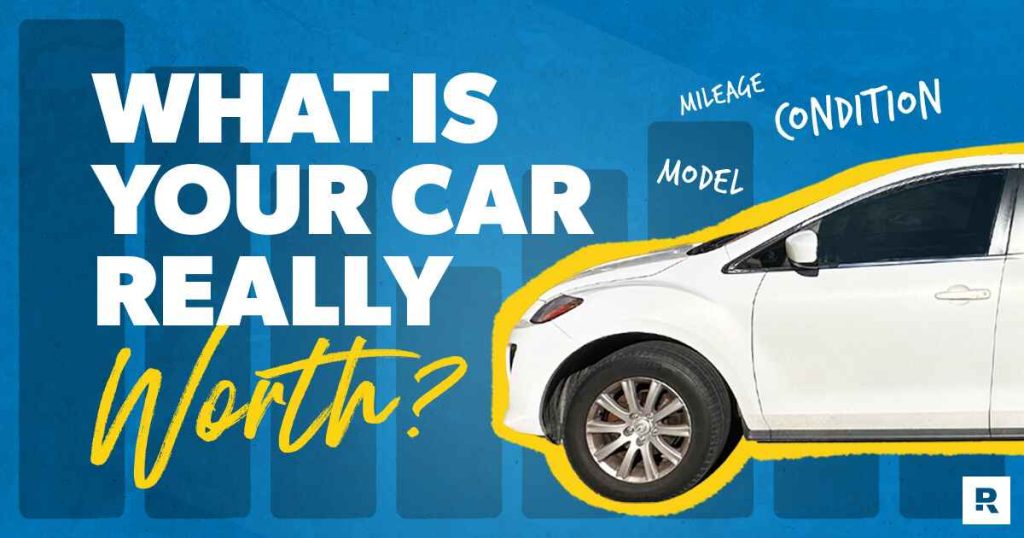Buying a new car is quite the adrenaline rush. But the second you drive your shiny new vehicle off the lot, it’s like lighting a stack of hundred-dollar bills on fire. Why? Depreciation.
Car depreciation is the sneaky wealth killer that nobody warns you about at the dealership. And most people have no clue how much money they’re actually losing.
Let me break down what depreciation really is so you can avoid the new-car trap and make smart moves that grow your wealth—not destroy it.
What Is Car Depreciation?
Car depreciation is the drop in your car’s value over time—aka how fast your car loses money.
Here’s the thing: The value of your car is constantly going down from the wear and tear of everyday use. And the more you drive your car, the faster its value will drop.
In fact, the moment you drive a car off the lot, it’s already worth less. It’s basically leaking money on your way home from the dealership.
Here’s a true fact you can Google: Most new cars lose about 60% of their value in the first five years.2 So, if you bought a new car tomorrow for $20,000 and then sold it five years from now, you can expect to sell it for around $8,000.
That’s car depreciation in a nutshell. You might not hear anybody bragging about that money drain when they get a new car, but it’s very real.
How Much Does a Car Depreciate per Year?
No matter the mileage, make or model, one thing is true about all cars: They lose their value over time. But new cars depreciate much faster than used cars:3
- A brand-new car loses at least 10% of its value in the first month of ownership.
- After one year, your car takes the biggest drop in value and will be worth about 20% less than what you paid for it. Twenty. Percent. Less.
- After that first-year dip, a new car depreciates by about 15% every year until it hits the five-year mark.
- And after five years, that new car has lost all its new-car smell and around 60% of its value.
| Car Depreciation Rates | ||
|---|---|---|
| Time | % Total Value Lost | Car Value |
| Initial Value | 0% | $48,000 |
| After 1 Month | 10% | $43,200 |
| After 1 Year | 20% | $38,400 |
| After 2 Years | 32% | $32,640 |
| After 3 Years | 42% | $27,744 |
| After 4 Years | 51% | $23,582 |
| After 5 Years | 60% | $19,200 |
How Car Depreciation Rates Are Determined
While cars automatically depreciate over time, there are other factors that can decrease your car’s value even faster—some you can sort of control and others you really can’t.
Here are the key factors that affect your car’s value the most:
- Model: The more popular a car is, the slower it loses value. After all, it’s way easier to sell something when buyers are looking for it. Lots of demand equals a higher sales price.
- Condition: Damage to the car—both to the exterior and interior—will put a dent in your car’s worth when you try to sell it.
- Mileage: The more miles you drive, the less your car will be worth. So if you can keep your car’s mileage down, your car will hold more of its value.
- Fuel economy: People love cars that go farther on a tank of gas. That’s why fuel-efficient cars usually hold their value longer.
- Accident history: If a car’s been in a wreck or has flood damage, it’s going to lose value—plain and simple. Even if it’s fixed up, most buyers are going to think twice before dropping their cash on it.
- Reputation: If the car’s make (aka brand name) is known for being long-lasting, it’ll hold its value longer (think Honda or Toyota). I mean, it makes sense. When you’re in the market for a used car, you want to feel like you’ll get a lot more years out of it.
- Color: Yep, certain colors hold value better because they appeal to more buyers. Neutral colors like black, white, silver and gray are usually worth more than, say, lime green.
How to Calculate Car Depreciation
Websites like Kelley Blue Book and Edmunds can give you a good idea of how much your car is worth and what you could make if you sold or traded it in today.
Dave’s easiest money-saving tip: See if you’re over paying for car insurance.
They’ll consider the factors I mentioned above to give you an accurate estimate in only a matter of minutes. It isn’t magic, but it’ll kind of feel like it. Just remember, estimates are just that—estimates. You can still negotiate a better deal.
Getting a value estimate is helpful, but the bottom line is simple: The newer the car, the faster it drops in value. And that doesn’t just apply to selling a car. You can use that knowledge to avoid the financial hit in the first place and keep more of your money working for you.
Cars That Depreciate the Most (and the Least)
While no vehicle is immune to car depreciation, some makes and models hold their value better than others.
Year after year, brands like Toyota, Honda and Chevrolet get high marks when it comes to holding their value.4
Here’s a list of vehicles with the lowest and highest rates of depreciation as of 2025:5
| Top 5 Vehicles With the Lowest Depreciation | ||
|
Rank |
Model |
Average 5-Year Depreciation |
|
1 |
Porsche 911 (sports car) |
19.5% |
|
2 |
Porsche 718 Cayman (sports car) |
21.8% |
|
3 |
Toyota Tacoma (truck) |
26% |
|
4 |
Chevrolet Corvette (coupe) |
27.2% |
|
5 |
Honda Civic (sedan/hatchback) |
28% |
| Top 5 Vehicles With the Highest Depreciation | ||
|
Rank |
Model |
Average 5-Year Depreciation |
|
1 |
Jaguar I-PACE (EV) |
72.2% |
|
2 |
BMW 7 Series (sedan) |
67.1% |
|
3 |
Tesla Model S (EV) |
65.2% |
|
4 |
INFINITI QX80 (SUV) |
65% |
|
5 |
Maserati Ghibli (sedan) |
64.7% |
Some things to keep in mind:
- Trucks and hybrids hold their ground the most.
- Sports cars and small SUVs? They’re value winners.
- Luxury rides and EVs (electric vehicles) are some of the fastest-dropping cars on the market. (Sidenote: I do drive a Tesla. Don’t judge. I knew exactly what I was getting into because I’m completely out of debt and saved up and paid cash for a 9-year-old model, letting the previous owners take that giant hit on depreciation. Translation? I did my research, avoided the largest hit of depreciation, and can stomach any future depreciation without worry.)
Cars that hold their value better are usually more expensive up front, but they’ll be easier to sell down the road. And yeah, that “cheap” 5-year-old BMW? It’s affordable for a reason. Those repairs are going to take a chunk out of your budget.
So, before you buy, do your homework. Depreciation matters. Don’t just look at the sticker price. Look at what that car will actually be worth in a few years. Look at the common repairs, recalls and issues for that make, model and year. And no matter what, make sure you’re getting a car you can actually afford.
How to Slow Down Car Depreciation
While you can’t avoid depreciation on a car, you can slow down the process. Here are three ways to better maintain your car’s value over time:
1. Keep your car’s mileage down.
The average American drives around 11,000 miles per year.6 That breaks down to more than 900 miles every month!
I know not everyone has access to public transportation. But there are definitely things you can do to cut down on the miles you drive.
Try to knock out all your errands in one weekly trip or carpool to work a couple times a week with a coworker. If you frequently take long cross-country road trips, consider putting those miles on a rental car instead. All those miles saved add up!
2. Stay on top of routine car maintenance.
From regular oil changes to tire rotations, it’s the little things that make a big difference when it comes to car maintenance. And staying on top of routine maintenance helps the car retain its value.
Not only that, but regular maintenance also improves the safety and performance of your car while saving you thousands of dollars in repairs down the road. It’s a win-win!
When in doubt, check your car owner’s manual for a servicing schedule so you know when to take your car in to your mechanic for maintenance.
3. Choose used over new.
The numbers don’t lie: New cars lose their value so much faster than used cars do. That’s why I’m a huge fan of buying reliable used cars—with cash!Buying a car you can afford with cash means you aren’t stuck in a car loan (and the monthly car payments) for years even as the value of the car drops. And drops. And drops.
And the used-car part means someone else bears the brunt of that new car’s rapid first-year depreciation. You’ll still have a dependable ride, but you’re saving money overall. Yes, please, and thank you.
P.S. If you really want a brand-new car, wait until your total household net worth is over $1 million. At that point, your wealth can take that deprecation hit without leaving a mark.
Budget for the Car’s True Cost—Not Just the Payment
When you’re budgeting for a car, don’t just focus on the car payment. The real cost is how much you pay overall and how fast that car loses value while you own it. New cars drop like a rock the second you drive them off the lot, and if you’re not paying attention, that can wreck your finances.
Make sure you budget for the whole picture. And here’s the thing: You can still negotiate. Just because someone gives you a number doesn’t mean you have to take it. You can walk into that dealership or private sale with confidence, pay cash for a good used car, and keep your budget strong instead of throwing cash into the depreciation ditch.
Make sure your car (and everything else in your life) actually fits your budget. Use EveryDollar to track your money, plan your spending, and stay in control.
Drive the car—don’t let the car drive your finances. Download EveryDollar today for free!
Read the full article here











